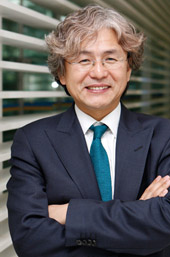 |
Hyungju Park, Chairman of Seoul ICM 2014 Organizing Committee
Your upcoming International Congress of Mathematicians (ICM) in Seoul is the largest congress in the mathematics community. How many delegates from how many countries do you expect?
The International Congress of Mathematicians (ICM) is indeed the largest international congress in the mathematics community with 117 years of history since its inaugural Congress held in Zurich in the summer of 1897. It is held once every four years under the auspices of the International Mathematical Union (IMU). As the 27th hosting city of ICM, Seoul has already attracted 3,407 from 121 countries worldwide (as of June 19, 2014), which is a record in the history of ICM. With the number continuously increasing, we expect about 5,000 to participate in the upcoming Congress.
What will be the top three issues at ICM 2014 from 13 to 21 August in Seoul?
One clear reason as to why many mathematicians pay special attention to ICM is that Fields Medals - often described as the “Nobel Prize” for mathematicians - are awarded at its opening ceremony. Recently the tradition has settled that the Head of State of the hosting country attends this event and personally presents the Medals.
Another reason, and probably the most meaningful and productive reason, is that ICM serves as the meeting place for the most prestigious and notable achievements in mathematics and to share and celebrate the recent advancements of the study.
Thirdly, under the theme of “Dreams and Hopes for Late Starters”, the Local Organizing Committee, on behalf of all Korean mathematicians, has been making exceptional efforts for the Congress to become a true worldwide gathering and to return the kindness and support Korea has received from its global friends and colleagues that made such dramatic progress of Korean mathematics possible in recent years. In particular, the Seoul ICM has planned and been successfully operating the NANUM project, which is a travel grant program to support 1,000 mathematicians from developing countries to participate in the Congress.
The Korean hosts will make every effort to make Seoul ICM 2014 a turning point for mathematics, to reach out to the public and to be recognized and valued by society. Why is this important?
Popularization of mathematics is an important issue in the mathematical community. It is very unfortunate that many students turn math-unfriendly in school after being discouraged for making calculative mistakes. As mathematicians, our duty is to raise awareness among the wider public that the typical preconception of mathematics cannot begin to fathom its true beauty and power.
For those who cannot come to Seoul, can they follow the International Congress of Mathematicians remotely?
All up-to-date information about the Congress can be found at www.icm2014.org. To better serve our friends and colleagues from overseas, we are also in the process of finalizing an android app and an ios app for SEOUL ICM 2014, which will provide both participants and non-participants with accessibility to important aspects of the Congress including schedules, public events, abstracts, papers, venue information and much more.
Why has Seoul and COEX been chosen for ICM 2014?
Aside from the symbolism as the capital city of Korea, Seoul is unique in that its 600-years-old history still coexists to this day with its high-tech, modern advancements. Seoul is also one of the safest places in the world for foreign travellers, with low crime rate, cutting-edge medical facilities and capable police and security authorities.
COEX, located in the heart of Seoul’s business district, is a commercial and cultural hub where Asia’s largest underground mall, three five-star hotels, a department store, a subway station, and an airport terminal are all located. As such, the venue has been selected for its convenient accessibility, close proximity with many embassies, large capacity, professionalism with international conferences, and its overall ability to provide visitors with a rich experience of all aspects of Seoul and of Korea.
What are the main challenges for the International Mathematical Union (IMU) today?
IMU is an international non-governmental and non-profit scientific organization, with the purpose of promoting international cooperation in mathematics. In recent years, IMU has made efforts to promote mathematics and math education in developing countries so that mathematics can become a basis of the scientific and economic development in these countries. Finding resources and coordinating various efforts in this direction have become main challenges facing IMU. Another challenge facing IMU is to find effective ways to encourage and cultivate young mathematical talents and to nurture them. ICM is one event that is likely to contribute to meeting these challenges.
Photo taken by DongA Science
The International Congress of Mathematicians (ICM) is the largest congress in the mathematics community. It is held once every four years under the auspices of the International Mathematical Union (IMU). IMU is an international non-governmental and non-profit scientific organization, with the purpose of promoting international cooperation in mathematics. Its objectives are: to promote international cooperation in mathematics, to support and assist the International Congress of Mathematicians and other international scientific meetings or conferences and to encourage and support other international mathematical activities considered likely to contribute to the development of mathematical science in any of its aspects, pure, applied, or educational. www.icm2014.org, www.mathunion.org